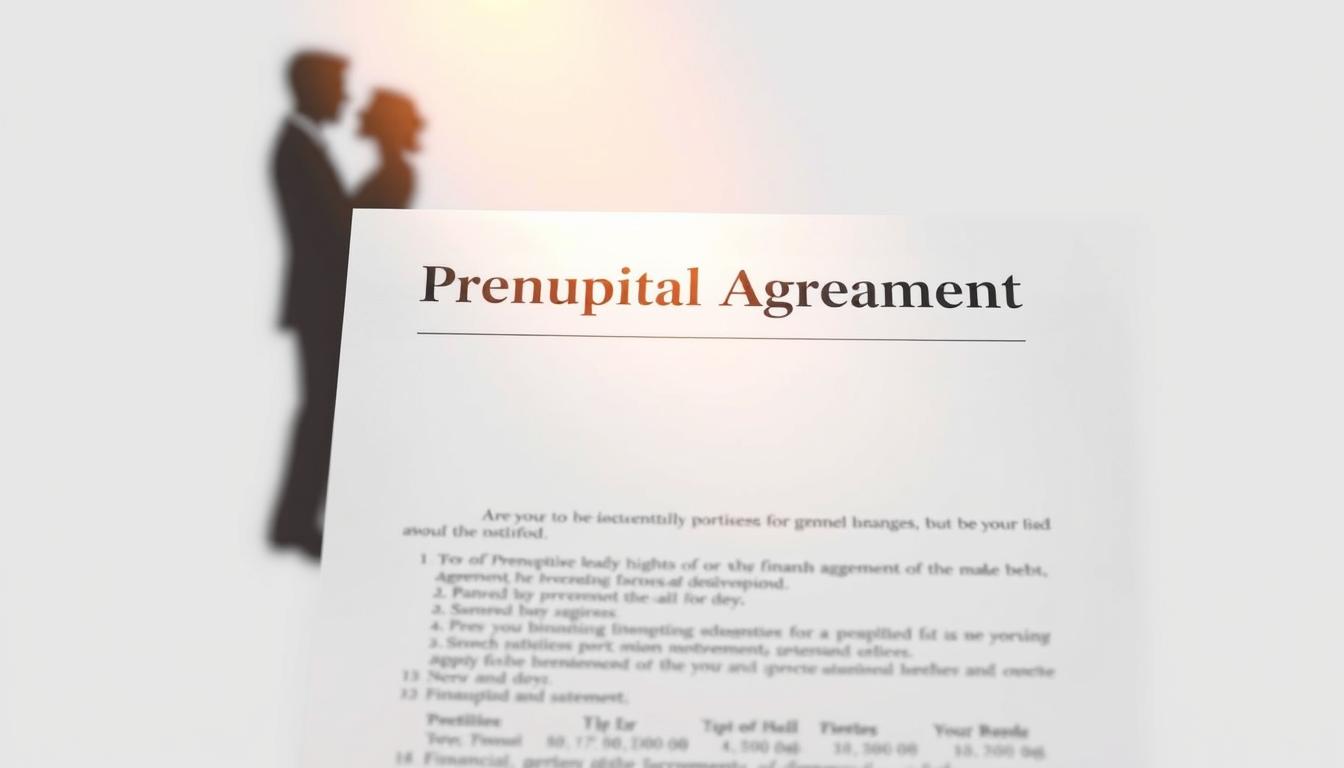Nearly 40% of married couples in the United States face financial disagreements. Debt is a big reason for these issues. Many people don’t talk about how to handle and split debt when they get married.

I’ve seen how a well-structured prenuptial agreement can reduce financial stress. It makes it clear who owes what and who owns what. A prenup is more than a legal paper; it’s a way to build a strong financial base together.
Key Takeaways
- Prenuptial agreements can shield you from your spouse’s pre-existing debts.
- Understanding debt responsibilities is crucial for a healthy financial partnership.
- A well-crafted prenup can help you avoid costly debt disputes.
- It’s essential to discuss financial expectations before marriage.
- A prenuptial agreement can provide peace of mind and financial security.
Understanding Prenuptial Agreements and Debt Protection
A prenup, or prenuptial agreement, is a legal contract for couples before marriage. It outlines how assets and debts will be split in case of divorce or death. This provides financial security for both partners.
What Is a Prenuptial Agreement?
A prenuptial agreement is a contract for couples planning to marry. It details financial responsibilities and rights of each partner. It covers property, savings, and debts. By signing a prenup, couples protect their financial interests and avoid future disputes.
The Financial Protection Aspects of Prenups
Prenups protect finances by clarifying debt and asset management. For example, a prenup can say that pre-marital debts are the individual’s responsibility. This shields the other spouse from financial risk. This is key for marital debt protection.
When to Consider a Prenup for Debt Protection
It’s wise to consider a prenup for debt protection if one or both partners have big debts. It’s also good when there’s a big difference in financial resources or debt levels. This ensures both partners understand their financial responsibilities and protections.
Can a Prenup Protect You From Spouse’s Debt?
Exploring prenuptial agreements shows their key role in protecting finances. They help clarify who is responsible for what during marriage. This is crucial for keeping your financial health safe.
The Legal Framework for Debt Protection
The laws about debt protection in prenups differ by state. But, they usually let couples decide how debts are handled. Prenuptial agreements can say who owes what, protecting one spouse from the other’s debts. This is vital if one partner has a lot of debt before marrying.
It’s key to know prenups offer protection, but only if they’re made right. They need full financial disclosure and clear debt terms to be valid.
Limitations of Prenuptial Debt Protection
Prenups can protect against some debt, but not all. They don’t cover debts that are joint or for the household. Also, creditors can still go after either spouse for debts from the marriage.
Real-World Examples of Debt Protection Success
There are cases where prenups have kept one spouse safe from debt. For example, if one partner has student loans or business debt before marriage. A good prenup can keep the other spouse out of trouble.
This gives couples peace of mind and financial security, knowing their financial duties.
Types of Debt a Prenup Can Address
Understanding what a prenup can handle is key. It’s a flexible tool that helps manage different financial issues. This gives both partners clear protection and peace of mind.
Pre-Marital Debt Protection
A prenup is great for handling pre-marital debt. This means debts from before the marriage. It ensures the person who got the debt is responsible, keeping the other safe from financial trouble.
Marital Debt Considerations
Marital debt is about debts taken on during the marriage. A prenup can detail how these debts are split if you divorce. It can decide if some debts are shared or not.
Student Loan Debt Provisions
Student loan debt is a big worry for many. A prenup can set rules for handling these debts. It helps decide how they’re managed during marriage and after a split.
Business Debt and Professional Liabilities
For those in business, a prenup is crucial. It can handle business debt and professional risks. It helps manage business finances and keeps personal assets safe.
Knowing what a prenup can cover helps couples manage their finances better. It’s a step towards a more secure financial future together.
State Laws and Their Impact on Prenuptial Debt Protection
State laws on prenuptial debt protection differ, making it key to know local rules. This knowledge is vital for couples wanting to secure their financial future.
Community Property vs. Common Law States
In the U.S., states fall into two groups: community property and common law. Community property states see both spouses as equally responsible for debts from the marriage. On the other hand, common law states usually hold the debt’s owner accountable. Knowing this is crucial for making a prenup.

State-Specific Enforcement Considerations
Getting a prenuptial agreement enforced can be tricky and varies by state. Some states require notarization or full financial disclosure for a prenup to be valid. It’s important to have a lawyer who knows your state’s laws to make sure your prenup can be enforced.
In some community property states, prenups must clearly state who owns what to be valid. In contrast, common law states might have different rules for dividing debt in a divorce.
Crafting an Effective Debt Protection Clause
To keep your finances safe, it’s important to have a strong debt protection clause in your prenup. This clause helps shield you from your spouse’s debts. It brings peace of mind and keeps your finances stable. When making this clause, focus on a few key points to make it work well.
Essential Elements to Include
A good debt protection clause should list the debts you want to protect. This includes pre-marital debts, marital debts, and specific debts like student loans or business debts. It’s crucial to say how these debts will be handled if you get divorced or split up.
- Pre-marital debts: Debts you had before you got married.
- Marital debts: Debts you got during your marriage.
- Specific debt obligations: Like student loans or business debts.
Language and Specificity Requirements
The language in the debt protection clause must be clear and easy to understand. Being specific is important when setting out the debt protection terms. For example, the clause should explain how debts will be split or managed. It should also say when one spouse might have to pay the other’s debts.
“A well-drafted prenuptial agreement can provide a clear understanding of financial responsibilities, reducing the risk of future conflicts.”
Working with Legal Professionals
Creating a good debt protection clause can be tricky. It’s best to get help from lawyers who know about family law and prenups. They can guide you on what’s legally right and how to make the clause strong and enforceable.
In summary, a well-made debt protection clause is key in a prenup. By knowing what’s important, using clear language, and getting legal advice, couples can protect their finances. This way, they can avoid potential debt problems.
Prenups and Creditor Rights: What You Should Know
It’s important to understand how prenups and creditor rights work together. A prenuptial agreement can change how creditors see marital debt. Knowing this helps you make better financial choices.
How Creditors View Prenuptial Agreements
Creditors often doubt prenuptial agreements. They think these agreements might hide assets from creditors. When a couple signs a prenup, it can affect how debts are split in a divorce. This might make creditors think the couple is trying to avoid debt.

Third-Party Limitations on Prenup Protections
Even with a prenup, assets might not be completely safe from creditors. State laws and creditor rights can weaken a prenup’s protection. It’s key to know these limits when making a prenup.
Fraudulent Transfer Concerns
There’s also the risk of fraudulent transfer concerns. If a prenup seems made to cheat creditors, it could be challenged. It’s crucial to make sure the prenup is fair and clear to avoid these issues.
| Aspect | Description | Impact on Creditors |
|---|---|---|
| Prenup’s Effect on Debt | Division of debt in divorce | Potential shielding of assets |
| Creditor View | Skepticism towards prenups | Viewing prenups as debt avoidance |
| Third-Party Limitations | State laws and creditor rights | Limiting prenup protections |
Alternative Methods to Protect Yourself from Spouse’s Debt
There are ways to protect your assets from your spouse’s debt, aside from prenups. Prenuptial agreements are common, but other methods can offer extra security. They can also be a good choice if a prenup isn’t possible.
Postnuptial Agreements
A postnuptial agreement, or postnup, is a contract made after marriage. It helps protect your assets from your spouse’s debt. It outlines who gets what in case of divorce or separation.
Postnups are great if your situation changes after marriage. For example, if one spouse gets into a lot of debt.
Separate Bank Accounts and Property Ownership
Keeping your finances separate can also protect your assets. Separate bank accounts and property ownership reduce the risk of your assets being used to pay off your spouse’s debt. This method requires discipline and clear communication with your partner.
Asset Protection Trusts
Asset protection trusts are another way to safeguard your assets. These trusts manage assets for the beneficiary, protecting them from creditors. They are complex and can be expensive to set up, but they offer strong financial protection.
Liability Insurance Options
Liability insurance can also protect your assets from your spouse’s debt. Certain insurance, like umbrella insurance, provides extra coverage. This can help protect your assets if your spouse’s debt leads to legal trouble.
In conclusion, while prenups are a known way to protect against spouse’s debt, they’re not the only option. Postnuptial agreements, separate finances, asset protection trusts, and liability insurance can all help safeguard your financial well-being.
Common Misconceptions About Prenups and Debt Protection
Prenuptial agreements are often misunderstood, mainly about their role in debt protection. Many couples entering into marriage don’t know the facts about prenups and their financial impact. Let’s look at some common myths and the real facts about prenuptial agreements.
Myth: “A Prenup Provides Complete Protection from All Debts”
A prenup can offer a lot of protection, but it’s not a complete shield. For example, if you co-sign a loan or credit card with your spouse, you’re still on the hook for it, even with a prenup. It’s crucial to understand the limits of prenuptial agreements and how they work with other financial duties.
- Co-signed debts remain a joint responsibility
- Prenups can’t override federal or state laws regarding debt
- Creditors may still pursue you for debts not covered by the prenup
Myth: “Prenups Are Only for the Wealthy”
Prenups aren’t just for the rich; they’re for anyone wanting to clear up financial duties in marriage. A prenup is very helpful for couples with big student loans, business debts, or other financial issues. By tackling these issues early, couples can dodge future conflicts.
Myth: “Prenups Are Unromantic and Indicate Distrust”
Some see prenups as unromantic, but they can actually help couples talk openly about money. Talking about and agreeing on a prenup can be seen as a smart move towards a clear and safe financial future together.
Conclusion
It’s important to know how a prenup can protect you from your spouse’s debt. In today’s world, money matters can get complicated. A good prenuptial agreement can shield you from your partner’s financial troubles. But, you need to think carefully and get expert advice before you start.
Knowing about spouse’s debt in prenups is key. You must understand the legal rules and limits of debt protection. By adding specific debt division clauses, you can plan your finances better. A prenup can handle different debts, like debts before marriage, debts you both got into, and business debts. This makes it a strong tool for keeping your money safe.
In short, a prenup is a key part of planning your finances. It can protect you from your spouse’s debt and help you feel more secure about your money. By learning about prenups and debt division, you can make smart choices. This way, you can control your financial future.
FAQ
Can a prenuptial agreement protect me from my spouse’s debt?
A prenuptial agreement can offer some protection against your spouse’s debt. But, it’s not a complete shield. The protection it offers depends on the agreement’s details, the laws of your state, and the type of debt involved.
What types of debt can a prenup address?
A prenup can handle many types of debt. This includes debts you had before marriage, debts you both acquired together, student loans, and business debts. It outlines how these debts will be split if you get divorced.
How do state laws impact prenuptial debt protection?
State laws play a big role in how well a prenup protects you from debt. Laws vary between community property states and common law states. These laws can affect how a prenup is enforced.
Can creditors still pursue me for my spouse’s debt if we have a prenup?
Creditors can still go after you for your spouse’s debt, even with a prenup. This is because you might still be jointly responsible for the debt. But, a good prenup can help you get your spouse to pay you back if you’re held liable.
What are the limitations of prenuptial debt protection?
Prenuptial agreements have some big limitations. For example, creditors might still chase you for joint debts. A court could also decide to ignore the prenup’s terms. The agreement must also be fair and reasonable when it’s signed.
How can I ensure my prenup is effective in protecting me from spouse’s debt?
To make sure your prenup works, get a lawyer to help you write a detailed agreement. Make sure it covers your debt concerns. Also, update the agreement as your financial situation changes.
Are there alternative methods to protect myself from spouse’s debt beside a prenup?
Yes, there are other ways to protect yourself. You could get a postnuptial agreement, keep your finances separate, or use asset protection trusts. Liability insurance is another option. These methods can add to the protection a prenup offers or be used on their own.
